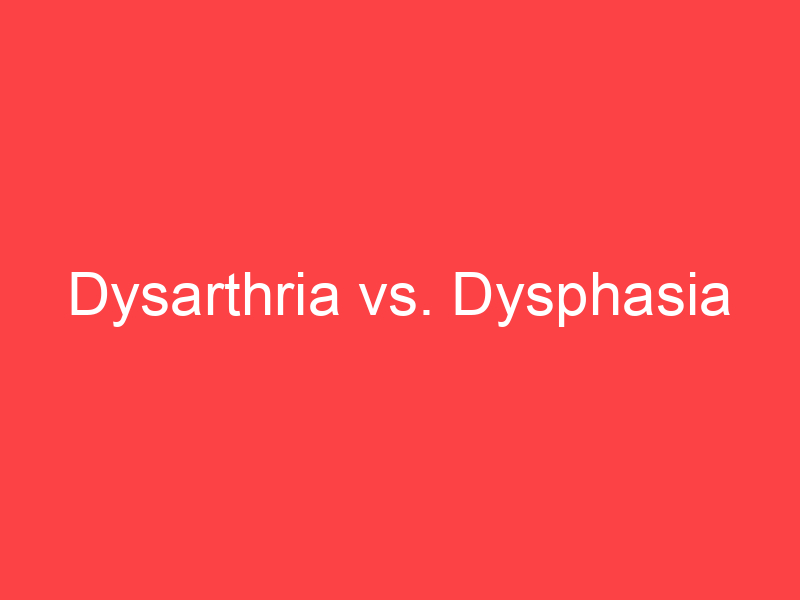Main Difference
The main difference between Dysarthria and Dysphasia is that the Dysarthria is a disglosia and Dysphasia is a inability to use spoken language.
-
Dysarthria
Dysarthria is a motor speech disorder resulting from neurological injury of the motor component of the motor-speech system and is characterized by poor articulation of phonemes. In other words, it is a condition in which problems effectively occur with the muscles that help produce speech, often making it very difficult to pronounce words. It is unrelated to problems with understanding language (that is aphasia), although a person can have both. Any of the speech subsystems (respiration, phonation, resonance, prosody, and articulation) can be affected, leading to impairments in intelligibility, audibility, naturalness, and efficiency of vocal communication. Dysarthria that has progressed to a total loss of speech is referred to as anarthria.
Neurological injury due to damage in the central or peripheral nervous system may result in weakness, paralysis, or a lack of coordination of the motor-speech system, producing dysarthria. These effects in turn hinder control over the tongue, throat, lips or lungs; for example, swallowing problems (dysphagia) are also often present in those with dysarthria.
Dysarthria does not include speech disorders from structural abnormalities, such as cleft palate, and must not be confused with apraxia of speech, which refers to problems in the planning and programming aspect of the motor-speech system. Just as the term “articulation” can mean either “speech” or “joint movement”, so is the combining form of arthr- the same in the terms “dysarthria”, “dysarthrosis”, and “arthropathy”; the term “dysarthria” is conventionally reserved for the speech problem and is not used to refer to arthropathy, whereas “dysarthrosis” has both senses but usually refers to arthropathy.
Cranial nerves that control the muscles relevant to dysarthria include the trigeminal nerve’s motor branch (V), the facial nerve (VII), the glossopharyngeal nerve (IX), the vagus nerve (X), and the hypoglossal nerve (XII). The term is from New Latin, dys- “dysfunctional, impaired” and arthr- “joint, vocal articulation”)
-
Dysphasia
Aphasia is an inability to comprehend and formulate language because of damage to specific brain regions. This damage is typically caused by a cerebral vascular accident (stroke), or head trauma; however, these are not the only possible causes. To be diagnosed with aphasia, a person’s speech or language must be significantly impaired in one (or several) of the four communication modalities following acquired brain injury or have significant decline over a short time period (progressive aphasia). The four communication modalities are auditory comprehension, verbal expression, reading and writing, and functional communication.
The difficulties of people with aphasia can range from occasional trouble finding words to losing the ability to speak, read, or write; intelligence, however, is unaffected. Expressive language and receptive language can both be affected as well. Aphasia also affects visual language such as sign language. In contrast, the use of formulaic expressions in everyday communication is often preserved. One prevalent deficit in the aphasias is anomia, which is a deficit in word finding ability.
The term aphasia implies that one or more communication modalities in the brain have been damaged and are therefore functioning incorrectly. Aphasia does not refer to damage to the brain that results in motor or sensory deficits, which produces abnormal speech; that is, aphasia is not related to the mechanics of speech but rather the individual’s language cognition (although a person can have both problems). An individual’s “language” is the socially shared set of rules as well as the thought processes that go behind verbalized speech. It is not a result of a more peripheral motor or sensory difficulty, such as paralysis affecting the speech muscles or a general hearing impairment.
Aphasia affects about 2 million people in the US and 250,000 people in Great Britain. Nearly 180,000 people in the US acquire the disorder a year. 84.5% of people have never heard of the condition.
-
Dysarthria (noun)
Difficulty in articulating words due to disturbance in the form or function of the structures that modulate voice into speech. One of the first indicative symptoms of acetylcholine receptors.
-
Dysphasia (noun)
Loss of or deficiency in the power to use or understand language as a result of injury or disease of the brain.

